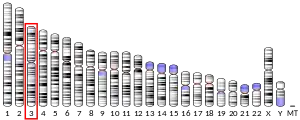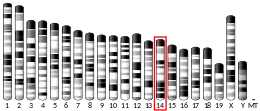DCP1A
mRNA-decapping enzyme 1A is a protein that in humans is encoded by the DCP1A gene.[5]
Decapping is a key step in general and regulated mRNA decay. The protein encoded by this gene is a decapping enzyme. This protein and another decapping enzyme form a decapping complex, which interacts with the nonsense-mediated decay factor hUpf1 and may be recruited to mRNAs containing premature termination codons. This protein also participates in the TGF-beta signaling pathway.[5]
Interactions
DCP1A has been shown to interact with DCP2[6] and UPF1.[6] It has also been shown to colocalize with GW182, and other markers of P-body.[7] Human DCP1A is heterotrimeric,[8] and makes contacts with the scaffold EDC3/4.[9]
References
- GRCh38: Ensembl release 89: ENSG00000272886 - Ensembl, May 2017
- GRCm38: Ensembl release 89: ENSMUSG00000021962 - Ensembl, May 2017
- "Human PubMed Reference:". National Center for Biotechnology Information, U.S. National Library of Medicine.
- "Mouse PubMed Reference:". National Center for Biotechnology Information, U.S. National Library of Medicine.
- "Entrez Gene: DCP1A DCP1 decapping enzyme homolog A (S. cerevisiae)".
- Lykke-Andersen J (December 2002). "Identification of a human decapping complex associated with hUpf proteins in nonsense-mediated decay". Molecular and Cellular Biology. 22 (23): 8114–21. doi:10.1128/MCB.22.23.8114-8121.2002. PMC 134073. PMID 12417715.
- Eystathioy T, Jakymiw A, Chan EK, Séraphin B, Cougot N, Fritzler MJ (October 2003). "The GW182 protein colocalizes with mRNA degradation associated proteins hDcp1 and hLSm4 in cytoplasmic GW bodies". RNA. 9 (10): 1171–3. doi:10.1261/rna.5810203. PMC 1370480. PMID 13130130.
- Tritschler F, Braun JE, Motz C, Igreja C, Haas G, Truffault V, Izaurralde E, Weichenrieder O (December 2009). "DCP1 forms asymmetric trimers to assemble into active mRNA decapping complexes in metazoa". Proceedings of the National Academy of Sciences of the United States of America. 106 (51): 21591–6. Bibcode:2009PNAS..10621591T. doi:10.1073/pnas.0909871106. PMC 2789166. PMID 19966221.
- Tritschler F, Eulalio A, Truffault V, Hartmann MD, Helms S, Schmidt S, Coles M, Izaurralde E, Weichenrieder O (December 2007). "A divergent Sm fold in EDC3 proteins mediates DCP1 binding and P-body targeting". Molecular and Cellular Biology. 27 (24): 8600–11. doi:10.1128/MCB.01506-07. PMC 2169425. PMID 17923697.
Further reading
- Bai RY, Koester C, Ouyang T, Hahn SA, Hammerschmidt M, Peschel C, Duyster J (March 2002). "SMIF, a Smad4-interacting protein that functions as a co-activator in TGFbeta signalling". Nature Cell Biology. 4 (3): 181–90. doi:10.1038/ncb753. PMID 11836524. S2CID 19938060.
- Callebaut I (May 2002). "An EVH1/WH1 domain as a key actor in TGFbeta signalling". FEBS Letters. 519 (1–3): 178–80. doi:10.1016/S0014-5793(02)02751-5. PMID 12023040. S2CID 84499961.
- Lykke-Andersen J (December 2002). "Identification of a human decapping complex associated with hUpf proteins in nonsense-mediated decay". Molecular and Cellular Biology. 22 (23): 8114–21. doi:10.1128/MCB.22.23.8114-8121.2002. PMC 134073. PMID 12417715.
- Ingelfinger D, Arndt-Jovin DJ, Lührmann R, Achsel T (December 2002). "The human LSm1-7 proteins colocalize with the mRNA-degrading enzymes Dcp1/2 and Xrnl in distinct cytoplasmic foci". RNA. 8 (12): 1489–501. doi:10.1017/S1355838202021726 (inactive 2021-01-13). PMC 1370355. PMID 12515382.CS1 maint: DOI inactive as of January 2021 (link)
- Leonard D, Ajuh P, Lamond AI, Legerski RJ (September 2003). "hLodestar/HuF2 interacts with CDC5L and is involved in pre-mRNA splicing". Biochemical and Biophysical Research Communications. 308 (4): 793–801. CiteSeerX 10.1.1.539.8359. doi:10.1016/S0006-291X(03)01486-4. PMID 12927788.
- Lehner B, Sanderson CM (July 2004). "A protein interaction framework for human mRNA degradation". Genome Research. 14 (7): 1315–23. doi:10.1101/gr.2122004. PMC 442147. PMID 15231747.
- Beausoleil SA, Jedrychowski M, Schwartz D, Elias JE, Villén J, Li J, Cohn MA, Cantley LC, Gygi SP (August 2004). "Large-scale characterization of HeLa cell nuclear phosphoproteins". Proceedings of the National Academy of Sciences of the United States of America. 101 (33): 12130–5. Bibcode:2004PNAS..10112130B. doi:10.1073/pnas.0404720101. PMC 514446. PMID 15302935.
- Liu J, Valencia-Sanchez MA, Hannon GJ, Parker R (July 2005). "MicroRNA-dependent localization of targeted mRNAs to mammalian P-bodies". Nature Cell Biology. 7 (7): 719–23. doi:10.1038/ncb1274. PMC 1855297. PMID 15937477.
- Rual JF, Venkatesan K, Hao T, Hirozane-Kishikawa T, Dricot A, Li N, Berriz GF, Gibbons FD, Dreze M, Ayivi-Guedehoussou N, Klitgord N, Simon C, Boxem M, Milstein S, Rosenberg J, Goldberg DS, Zhang LV, Wong SL, Franklin G, Li S, Albala JS, Lim J, Fraughton C, Llamosas E, Cevik S, Bex C, Lamesch P, Sikorski RS, Vandenhaute J, Zoghbi HY, Smolyar A, Bosak S, Sequerra R, Doucette-Stamm L, Cusick ME, Hill DE, Roth FP, Vidal M (October 2005). "Towards a proteome-scale map of the human protein-protein interaction network". Nature. 437 (7062): 1173–8. Bibcode:2005Natur.437.1173R. doi:10.1038/nature04209. PMID 16189514. S2CID 4427026.
- Fenger-Grøn M, Fillman C, Norrild B, Lykke-Andersen J (December 2005). "Multiple processing body factors and the ARE binding protein TTP activate mRNA decapping". Molecular Cell. 20 (6): 905–15. doi:10.1016/j.molcel.2005.10.031. PMID 16364915.
- Olsen JV, Blagoev B, Gnad F, Macek B, Kumar C, Mortensen P, Mann M (November 2006). "Global, in vivo, and site-specific phosphorylation dynamics in signaling networks". Cell. 127 (3): 635–48. doi:10.1016/j.cell.2006.09.026. PMID 17081983. S2CID 7827573.
This article is issued from Wikipedia. The text is licensed under Creative Commons - Attribution - Sharealike. Additional terms may apply for the media files.





